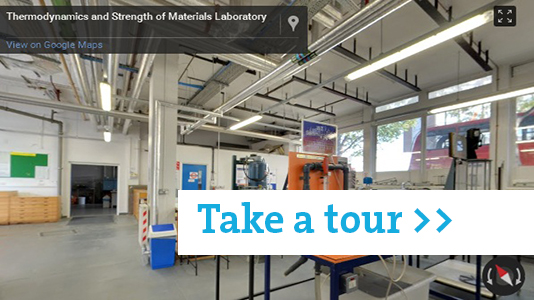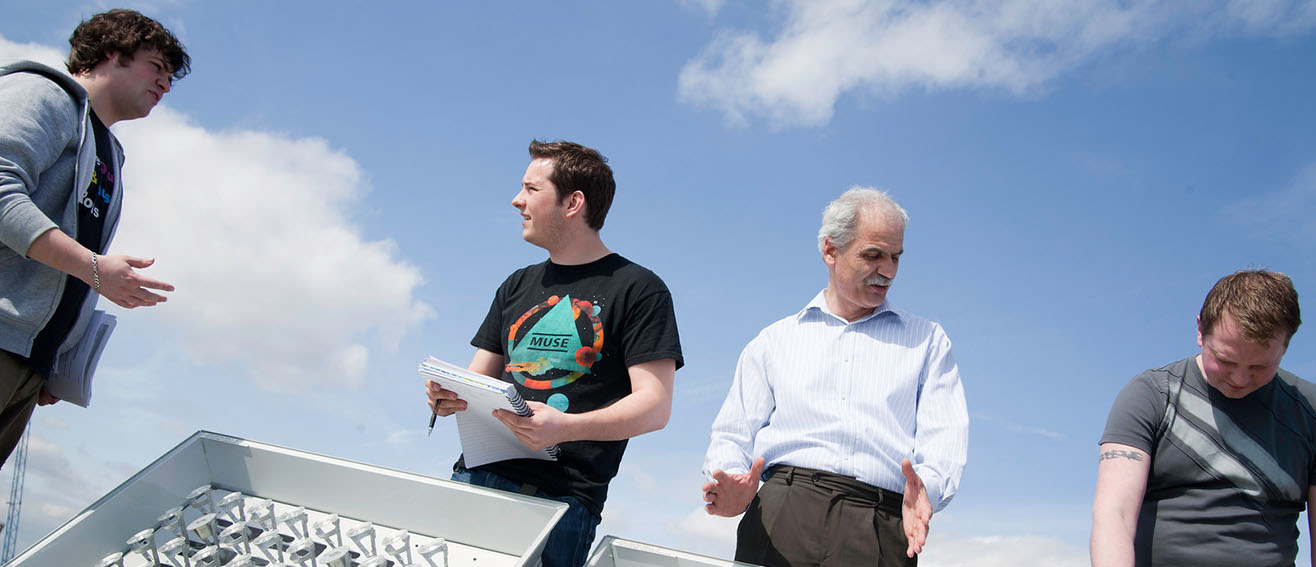
Civil and Building Services Engineering
We deliver professionally accredited construction, infrastructure, maintenance and sustainability courses and applied researchWe’re a top modern university in London for research in General Engineering (REF 2014), with grants of £4million. Half of all our students study part-time and are employer sponsored.
We have a long history of educating engineering professionals. With roots in London Council School of Building (1904), Brixton School of Building (1940) and the National College for Heating, Ventilating, Refrigeration and Fan Research (1948), we've been delivering professional engineering education for over 100 years.
Specialising in civil and building services engineering allows engineers to utilise their talents in careers that develop complex systems, products and processes to solve useful and practical real-world problems, such as how to keep the underground cool in the most cost-efficient and effective way. The focus is very much kept on customer needs throughout the life cycle of design, testing, manufacturing, installation, operation, monitoring and future planning.
All of our individual course entries have specialist careers information. Search our courses and download our Careers in Engineering Guide (PDF File 3,650 KB).
Accreditations
Employers actively look for graduates with accredited degrees. You'll find that all of our degrees are accredited by or developed in partnership with all the leading professional accrediting bodies. These essential relationships allow our students to graduate with internationally and professionally recognised qualifications – vital for their future careers.
Building services engineering
Our graduates work in the design, construction and consulting sectors, as well as in maintenance and facilities management. From the very start of the building design, engineers are involved helping architects and other members of the design team to get the size, shape and configuration of the building right. They determine strategies for designing energy efficient buildings, making them sustainable in the long term. Find out more about careers in building service engineering.
Civil engineering
Through infrastructure projects, civil engineers make a difference to people's lives. They provide a water supply or road network, refurbish buildings, redevelop inner city areas or work on prestige projects like Crossrail. Graduates meet the diverse challenges of structural, highway and transportation, water, public health and geotechnical branches of civil engineering to make improvements and create solutions. Find out more about careers in civil engineering.
We offer a range of undergraduate and postgraduate courses (HNC, HND, BSc, BEng, MSc) in civil and building services engineering and related fields, such as acoustics. Courses carry professional accreditation. The School of Built Environment and Architecture is respected by the building industry and many of our students study on a part-time basis, sponsored by their employer.
A member of staff, expert in the chosen field, is directly responsible for guiding and supporting your research programme. Offered full-time and part-time.
View courseThe Institute of Acoustics Diploma provides sufficient specialist academic training to satisfy the educational requirements for Membership of the Institute of Acoustics.
View courseAccredited by the Engineering Council, this course is the first step to becoming a qualified Chartered Civil Engineer. Course offered on a full-time, sandwich and part-time basis.
View courseBTEC Higher National Diploma, accredited by the Chartered Institution of Building Services Engineers (CIBSE) and the Energy Institute. Delivered on a full-time or part-time day-release basis.
View courseThe Civil Engineering Apprenticeship includes a degree qualification in Civil Engineering BEng (Hons) and a qualification leading towards Chartered Civil Engineer status.
View courseThe Building Services Technician Apprenticeship includes an HNC in Building Service Engineering and a qualification leading towards Incorporated Engineer status.
View courseAccredited by the Chartered Institute of Building Services Engineers and the Institute of Acoustics, this acoustics masters is a step towards Chartered Engineer Status. Study full-time or part-time.
View courseApproved by the JBM for Engineering Technician (EngTech) Status, this course is for those working in civil engineering and seeking to extend their technical education.
View courseAccredited by the Chartered Institution of Building Services Engineers and the Energy Institute, this BEng degree course is the first step to Chartered Engineer status.
View courseThe Building Services Design Engineering Apprenticeship includes a degree qualification in Building Services Engineering BEng (Hons) and a qualification leading towards Incorporated Engineer status.
View courseAccredited by the Joint Board of Moderators as meeting the further learning required for Chartered Engineer Status. This is the broadest of our three postgraduate Civil Engineering courses.
View courseThe Construction Site Engineering Technician Apprenticeship includes an HNC in Civil Engineering and will teach you the skills required to achieve Technician status.
View courseAccredited by the Engineering Council, this course is the first step to becoming a qualified Chartered Civil Engineer. Course offered on a full-time, sandwich and part-time basis.
View courseThe Institute of Acoustics certificate course is for technical and scientific staff, whose employment requires them to gain a working knowledge of noise or vibration measurement. Short course, 5 days full-time.
View courseAccredited by the Joint Board of Moderators for Chartered Engineer Status. This advanced postgraduate course covers structural analysis, design and structural computing. Offered full-time and part-time.
View courseApproved by the JBM for Engineering Technician (EngTech) Status, this course is for those working in civil engineering and seeking to extend their technical education.
View courseAccredited by the Chartered Institute of Building Services Engineering and the Energy Institute, this Masters course is available on a part-time and full-time basis.
View courseWe enhance students’ experience of civil and building services engineering with equipment-rich facilities. As the field expands into both applied science and engineering, there are many opportunities for students to develop their skills in the workshop, specialist £2.8 million sustainability centre, acoustic laboratory, digital robotics lab and Building Information Modelling Centre.
Our facilities for materials research are extensive and include sophisticated equipment for growing engineering coatings and functional thin films for devices such as solar cells. They support sophisticated characterisation techniques, including electron and atomic force microscopies and nanohardness testing that can probe materials at the nanoscale.
Virtual tour
Take a virtual tour of the thermodynamics and strength of materials laboratories.
Facilities case studies
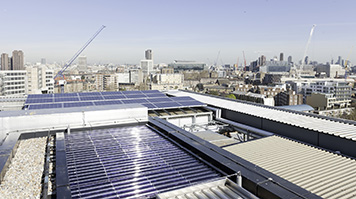
Centre for Efficient and Renewable Energy in Buildings (CEREB)
This unique resource supports the teaching, research and demonstration of low carbon energy technologies in the built environment. With our Flexible Climate Simulator we're testing and developing new techniques and systems. It allows us to construct full-scale and scaled environments to better understand climatic influence and be capable of controlling strict environmental conditions.
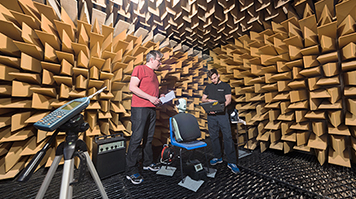
Acoustics Laboratories
A rare find in London, our anechoic and reverberation chambers are key pieces of equipment in acoustic and environment testing work. Both chambers can be used for simulating idealised acoustic conditions for researching a number of noise phenomena: sound power determination, binaural recordings, measuring source directivity, the testing of hearing protectors and the demonstration of fundamental acoustic principles.

Digital Architecture Robotic Lab (DARLab)
This advanced digital manufacturing robotic lab is designed for high-quality research, as well as developing commercial applications for architecture. This is achieved by using an industrial robotic arm in combination with quick change plates, which are able to easily modify the configuration of cells depending on the process to be applied.
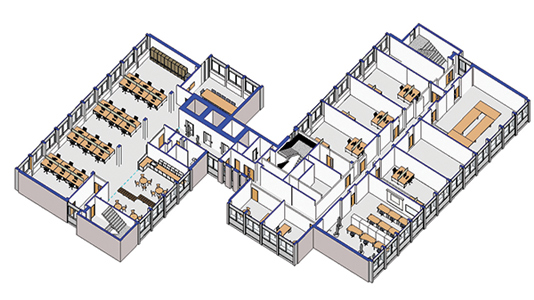
Building Information Modelling (BIM) Centre
BIM is an approach to managing and planning every aspect of design and operation in the construction process in a better, more efficient way to improve the basis upon which the construction industry and its clients operate. The BIM Centre acts as a hub for innovation, professional training and networking amongst practice experts in the built environmental sector.
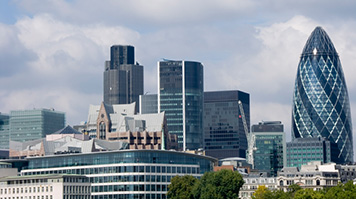
Constructionarium for civil engineers
The Constructionarium is a national learning facility created for civil engineering undergraduates to gain a practical site experience. Spread over six days, the Constructionarium allows students to develop practical skills and establish working links with industry.
Accessing our facilities
Facilities, students and staff feature regularly in our knowledge transfer and consultation activities with industry. Read more about how the School works with business at LSBU.
In this section
- Architecture
- Civil and Building Services Engineering
- Construction, Property and Surveying
